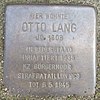Otto Ernst Lang
Otto Ernst Lang (* 30th January 1908 in Hamburg , † 6. May 1945 at Kos ) was a Hamburg harbor workers and social democratic resistance fighters in the era of National Socialism .
Life
Lang spent most of his life working as a quay worker in the Port of Hamburg. From 1922 he was involved in the Socialist Workers' Youth (SAJ). In 1924 he became a member of the Reichsbanner Schwarz-Rot-Gold and was also politically active in the SPD . He was involved in the party group in Hamburg-Rothenburgsort .
After the SPD was banned, Lang continued his political work and resisted National Socialism . He printed leaflets and distributed illegal documents smuggled in from Denmark . The copying machine of his resistance group stood under his living room table, which was so well camouflaged under a large tablecloth that the police could not find the machine during the house search when the resistance group was exposed by denunciation by the Gestapo on February 5, 1935 and Lang with three other relatives this group was arrested. He spent three months in the Fuhlsbüttel police prison and was released from prison at the end of April 1935. Lang was arrested again on October 16, 1935 after members of another resistance group consisting of Social Democrats were exposed. Lang was accused of distributing highly treasonable writings and of undermining the SPD party ban. On December 19, 1935, Lang was sentenced to two and a half years in prison with loss of honor for "violating the law against the formation of new parties" and "preparing for high treason" in the trial against Hausen and comrades , which he was sentenced to in the prison camps in Emsland and in the Börgermoor concentration camp spent. Wilhelm Hausen (* 1907) was the coordinator of the social democratic resistance in Hamburg-Hamm and at the Blohm + Voss shipyard .
Lang was married to Senta, the couple had a daughter named Helga. During Lang's imprisonment, his family received no government support, so that Lang's wife was only able to make a living with cleaning work. Lang's wife also had to go to the Gestapo every week. The family and their visit were also monitored by the Gestapo. Lang was released from prison in January 1938 and then worked as a fitter for the American mechanical engineering company International Harvester Company in Hamburg. There he found contact with opponents of the Nazi regime again.
At the beginning of December 1942 he was drafted into the penal battalion 999 due to so-called unworthiness for military service and after a short training period he was deployed during the campaign in Africa. In May 1943 he was wounded near Tunis , flown to Italy and treated in a hospital in Gars am Inn . After recovering, he was transferred to Greece . He died on May 6, 1945 together with a comrade while trying to escape from the island of Kos on a self-made raft.
Honors
- On May 3, 2006, a stumbling block in front of the house on Gleise 8 in Hamburg-Veddel was inaugurated in memory of Otto Ernst Lang.
literature
- Working Group History of the Hamburg SPD (Ed.): For Freedom and Democracy - Hamburg Social Democrats in Persecution and Resistance 1933–1945. Hamburg 2003, ISBN 3-8330-0637-4 . (online at: books.google.com )
- Helga Roepert: At the beginning of 1935 my father's group was discovered ... memories of a social democrat of a happy childhood in terrible times. (History Discussion Group, No. 85). Friedrich-Ebert-Stiftung , Bonn 2010, ISBN 978-3-86872-262-8 . (online at: library.fes.de , pdf, 511 kB)
Web links
- Stumbling blocks in Hamburg - Otto Ernst Lang
- SPD - History Working Group - Otto Ernst Lang (the data record must be found using the search function)
Individual evidence
- ↑ a b Stolpersteine in Hamburg - Otto Ernst Lang
- ↑ Memorial book ( Memento of the original of December 22, 2009 in the Internet Archive ) Info: The archive link was inserted automatically and has not yet been checked. Please check the original and archive link according to the instructions and then remove this notice. on traced.spd-hamburg.de (PDF file; 515 kB)
- ↑ The first stumbling block on the Veddel ( page no longer available , search in web archives ) Info: The link was automatically marked as defective. Please check the link according to the instructions and then remove this notice. on reichsbanner.de
| personal data | |
|---|---|
| SURNAME | Lang, Otto Ernst |
| BRIEF DESCRIPTION | German resistance fighters against fascism |
| DATE OF BIRTH | January 30, 1908 |
| PLACE OF BIRTH | Hamburg |
| DATE OF DEATH | May 6, 1945 |
| Place of death | at Kos |
